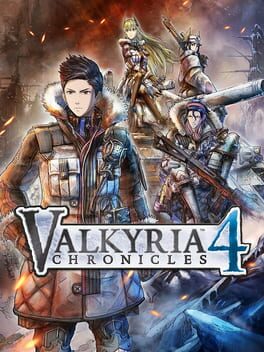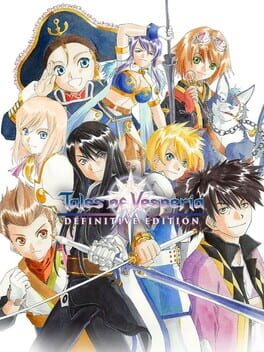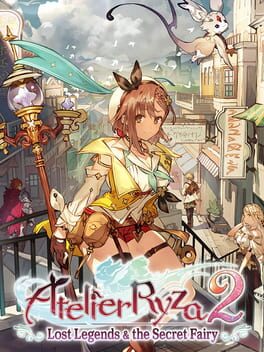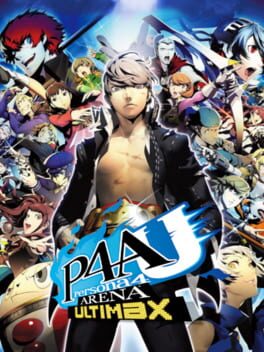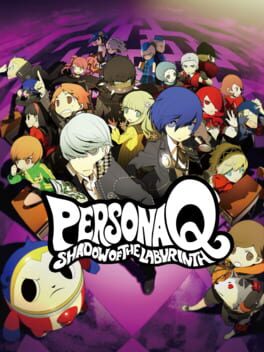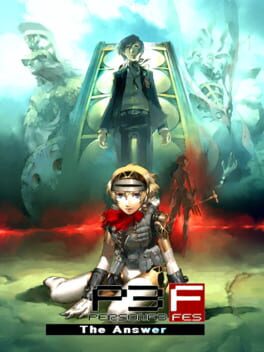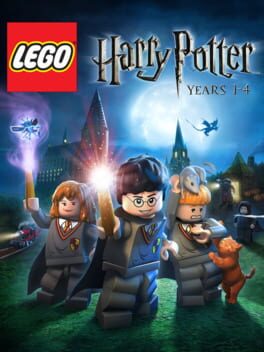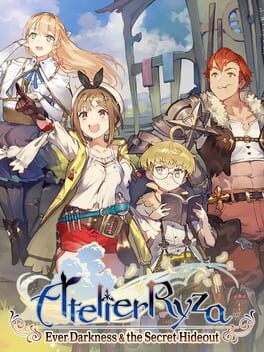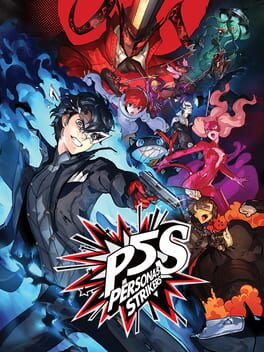Kanjibestboy
Beat ending A. I might come back to it and complete the other endings, but I might just watch a playthrough on YouTube.
This game reminds my of Chrono Cross in a weird way. It absolutely nails its setting and atmosphere, and the soundtrack is top notch, but I think the characters are a little underbaked and they saved most of the story for the last 10% of the game. I reserve the right to change my position if I get around to doing the other endings, but that's where my head is now.
This game reminds my of Chrono Cross in a weird way. It absolutely nails its setting and atmosphere, and the soundtrack is top notch, but I think the characters are a little underbaked and they saved most of the story for the last 10% of the game. I reserve the right to change my position if I get around to doing the other endings, but that's where my head is now.
I really liked this game. Of the LaD series, I have only played this and Yakuza 0, so I know I have several huge blind spots in my critique. But comparing the two, I think Yakuza 0 just edges it. I really love the 80's boom times Japan setting of 0, and I thought the substories and side quests were more varied, silly, and weird than in 7. And while I am fond of turn-based combat, I prefer the combat in 0. But where 7 absolutely shines is in its story and cast. It only took a few hours of gameplay for Ichiban to immediately ascend to the top tier of RPG protagonists in my opinion. He is every bit the hero he sees himself as in his mind, and I found myself immediately rooting for him and becoming emotionally invested in his story. And compared to 0, where money flowed like water and a million yen was pocket change; seeing Ichiban's come up from scrounging for ten yen coins underneath vending machines to achieving financial security was so emotionally satisfying.
I was skeptical about affixing JRPG tropes to a Yakuza game, but it worked better than it had any right to. After all, what JRPG doesn't have a motley collection of interesting characters and weirdoes (which Yakuza always has in spades). And Ichiban's rise from rags to riches and the interesting people he befriends along the way grafted on perfectly to the archetypical hero's journey. Shout out to Best Girl Saeko and certified DILF Adachi.
I'm going to take a break and play a shorter game or two next, but I am excited to jump into LaD Gaiden and Infinite Wealth soon.
I was skeptical about affixing JRPG tropes to a Yakuza game, but it worked better than it had any right to. After all, what JRPG doesn't have a motley collection of interesting characters and weirdoes (which Yakuza always has in spades). And Ichiban's rise from rags to riches and the interesting people he befriends along the way grafted on perfectly to the archetypical hero's journey. Shout out to Best Girl Saeko and certified DILF Adachi.
I'm going to take a break and play a shorter game or two next, but I am excited to jump into LaD Gaiden and Infinite Wealth soon.
2024
This review contains spoilers
At the risk of sounding lame, I cried when they showed Aigis at Yakushima Beach during the teaser reveal. Suffice to say, I was greatly anticipating this game, and my expectations were sky high. I was never going to agree with every change made to the story or gameplay, but the fact that this remake even exists is a minor miracle. The fact that 80-90% of the changes are positive is an even greater miracle. I'm grateful that I got to experience this story again in glorious HD. All that being said, I did want to share my thoughts on some of the major changes: the good, the bad, the in-between while the experience is still fresh in my mind. I'm just going to throw my thoughts out there, so apologies for any rambling or half-formed ideas. And I'm not going to cover every thought I have about every minute detail of the game; only the major ones. This review is going to be long enough already.
The good:
-Fully-voiced social links. This was the most obvious, slam-dunk positive addition to the game. Some people may disagree with my other positives, but not this one. The social links in P3, on balance, are the worst of the modern games, but having them voiced elevated the worst S-links to tolerable and the mid-tier links to good. Special mention to Maiko's VA Grace Yu and Yuko's VA Shelby Young (cast her as a main character in Persona 6, please!).
-Speaking of the voice acting, I think the main cast mostly knocked it out of the park. The only characters I thought were worse were Yukari and Akihiko, but then only slightly. Allegra Clark and Zeno Robinson knocked it out of the park as Mitsuru and Junpei respectively, and everyone else I think were slightly better than their previous voice actors.
-The linked episodes. This was the biggest surprise to me. I thought going in that the introduction of linked episodes for the male members of SEES was a cop-out, but I actually ended up liking these significantly more than the traditional social links with the female members of SEES. The fact that they are tied to specific times within the narrative and the fact that there were only five of them, and therefore each episode was longer and more substantial was a wonderful change. I think it's fairly obvious that the developers are using P3R to try out new concepts and ideas for P6, and I really hope they change party member social links to be more akin to these linked episodes. Tie social link progression to the story so characters can react to events in the narrative. Involve other characters more in others' social links. You'll end up with something more narratively satisfying.
-The UI. They were able to ape some of the style and slickness of Persona 5's UI while still staying true to the original source material. P3 is a much darker game, both literally and figuratively, so I am glad they didn't go full-P5 and make the presentation too vibrant and too snappy.
-Persona fusion and the Compendium. As in it was a lot easier to customize Personas to your liking. It was no longer prohibitively expensive to summon Personas from the Compendium. You didn't need to have space for every Persona needed for a special fusion. All of the QoL improvements to fusion made in P5 were carried over. It's a very obvious improvement, but worth pointing out.
-They kept Tara Platt as Elizabeth. Unlike most, I was perfectly fine with Atlus recasting SEES, but no one else on earth could play Elizabeth. They could do the fourth Persona 3 remake in 2062 and they would need to roll her out in a wheelchair to record her lines.
The bad:
-Lack of the original battle system. I'm not going to pretend that the original AI-controlled, tactics-based turn-based system wasn't flawed. I'm not going to pretend the switch to a full user-controlled party wasn't always going to happen and be preferred by the overwhelming majority of players. I just wish they had retained the original battle system as an option. If they were able to improve upon it, even better. The Tales games allow the player a great degree of control over the AI-controlled party's behavior and tendencies; why couldn't Atlus try doing the same?
-Difficulty. Would it kill Atlus to make a Merciless difficulty that is actually difficult? The first couple full moon bosses were difficult, but by mid-game I only died once, and that was because I wasn't paying attention to my health on a random battle. Nyx Avatar, which took me nearly 90 minutes on hard difficulty in FES and is my favorite final boss in any JRPG ever, was barely a speed bump in Reload. I beat it in about 15 minutes on Merciless and was never in danger. And I didn't grind nearly enough to make the endgame as trivially easy as it was. I was only one level higher than the network average, and only spent two nights per lunar cycle in Tartatus, save for January which I spent three nights. Atlus had to have known that a huge percentage of people playing Reload would have already played the original, so having a truly insane difficulty for us more experienced players would have been great. I'm doubtful this will happen in 6, but I would love a real difficult experience at least once outside of the original P3.
The in-between:
-Music. Full Moon Full Life and Color Your Night are great additions to the Persona music canon. But the remakes of the original songs are a bit of a mixed bag. The only overworld song I thought they improved upon was Changing Seasons. The rest were either as good or slightly worse.
-Tartarus. I know they were limited to what they could change to Tartarus without betraying the fundamental concept of Tartarus. But it still felt kind of meh to explore. Having more delineated themes in each section was a plus. The major arcana shuffle time cards added to the fun of exploring, too. Monad doors? Fine. But I think what was missing was the danger/risk aspect of exploring Tartarus in the original game. It's too easy now to sneak attack shadows, so ambushes are almost nonexistent. And as crazy as it sounds, Reload actually made me miss the tiredness mechanic from the original. Without it, grinding Tartarus is a lot more mindless. You lack the sense of danger, the need to rotate party members in and out, and the risk/reward aspect of exploring Tartarus that you had in the original. Do I push through those last few floors to get to the border floor tonight even though one ambush will likely wipe out my party? Do I grind for money solo and exhausted so I can afford that new weapon or armor I want?
All that being said, I still absolutely love this game. The themes this game explores are more relevant now than when it was originally released. The last quarter of the game, and especially the ending are perfect. The cast is great. The music is great. The sense of atmosphere is great. Persona 3 Reload was able to surpass the original in my eyes. It's not a perfect game, but it deserves a perfect score.
The good:
-Fully-voiced social links. This was the most obvious, slam-dunk positive addition to the game. Some people may disagree with my other positives, but not this one. The social links in P3, on balance, are the worst of the modern games, but having them voiced elevated the worst S-links to tolerable and the mid-tier links to good. Special mention to Maiko's VA Grace Yu and Yuko's VA Shelby Young (cast her as a main character in Persona 6, please!).
-Speaking of the voice acting, I think the main cast mostly knocked it out of the park. The only characters I thought were worse were Yukari and Akihiko, but then only slightly. Allegra Clark and Zeno Robinson knocked it out of the park as Mitsuru and Junpei respectively, and everyone else I think were slightly better than their previous voice actors.
-The linked episodes. This was the biggest surprise to me. I thought going in that the introduction of linked episodes for the male members of SEES was a cop-out, but I actually ended up liking these significantly more than the traditional social links with the female members of SEES. The fact that they are tied to specific times within the narrative and the fact that there were only five of them, and therefore each episode was longer and more substantial was a wonderful change. I think it's fairly obvious that the developers are using P3R to try out new concepts and ideas for P6, and I really hope they change party member social links to be more akin to these linked episodes. Tie social link progression to the story so characters can react to events in the narrative. Involve other characters more in others' social links. You'll end up with something more narratively satisfying.
-The UI. They were able to ape some of the style and slickness of Persona 5's UI while still staying true to the original source material. P3 is a much darker game, both literally and figuratively, so I am glad they didn't go full-P5 and make the presentation too vibrant and too snappy.
-Persona fusion and the Compendium. As in it was a lot easier to customize Personas to your liking. It was no longer prohibitively expensive to summon Personas from the Compendium. You didn't need to have space for every Persona needed for a special fusion. All of the QoL improvements to fusion made in P5 were carried over. It's a very obvious improvement, but worth pointing out.
-They kept Tara Platt as Elizabeth. Unlike most, I was perfectly fine with Atlus recasting SEES, but no one else on earth could play Elizabeth. They could do the fourth Persona 3 remake in 2062 and they would need to roll her out in a wheelchair to record her lines.
The bad:
-Lack of the original battle system. I'm not going to pretend that the original AI-controlled, tactics-based turn-based system wasn't flawed. I'm not going to pretend the switch to a full user-controlled party wasn't always going to happen and be preferred by the overwhelming majority of players. I just wish they had retained the original battle system as an option. If they were able to improve upon it, even better. The Tales games allow the player a great degree of control over the AI-controlled party's behavior and tendencies; why couldn't Atlus try doing the same?
-Difficulty. Would it kill Atlus to make a Merciless difficulty that is actually difficult? The first couple full moon bosses were difficult, but by mid-game I only died once, and that was because I wasn't paying attention to my health on a random battle. Nyx Avatar, which took me nearly 90 minutes on hard difficulty in FES and is my favorite final boss in any JRPG ever, was barely a speed bump in Reload. I beat it in about 15 minutes on Merciless and was never in danger. And I didn't grind nearly enough to make the endgame as trivially easy as it was. I was only one level higher than the network average, and only spent two nights per lunar cycle in Tartatus, save for January which I spent three nights. Atlus had to have known that a huge percentage of people playing Reload would have already played the original, so having a truly insane difficulty for us more experienced players would have been great. I'm doubtful this will happen in 6, but I would love a real difficult experience at least once outside of the original P3.
The in-between:
-Music. Full Moon Full Life and Color Your Night are great additions to the Persona music canon. But the remakes of the original songs are a bit of a mixed bag. The only overworld song I thought they improved upon was Changing Seasons. The rest were either as good or slightly worse.
-Tartarus. I know they were limited to what they could change to Tartarus without betraying the fundamental concept of Tartarus. But it still felt kind of meh to explore. Having more delineated themes in each section was a plus. The major arcana shuffle time cards added to the fun of exploring, too. Monad doors? Fine. But I think what was missing was the danger/risk aspect of exploring Tartarus in the original game. It's too easy now to sneak attack shadows, so ambushes are almost nonexistent. And as crazy as it sounds, Reload actually made me miss the tiredness mechanic from the original. Without it, grinding Tartarus is a lot more mindless. You lack the sense of danger, the need to rotate party members in and out, and the risk/reward aspect of exploring Tartarus that you had in the original. Do I push through those last few floors to get to the border floor tonight even though one ambush will likely wipe out my party? Do I grind for money solo and exhausted so I can afford that new weapon or armor I want?
All that being said, I still absolutely love this game. The themes this game explores are more relevant now than when it was originally released. The last quarter of the game, and especially the ending are perfect. The cast is great. The music is great. The sense of atmosphere is great. Persona 3 Reload was able to surpass the original in my eyes. It's not a perfect game, but it deserves a perfect score.
This review contains spoilers
"When you do child slavery, it's bad. But when we do child slavery, it's good."
I really liked the first half of this game. It's very similar to VC1, but if it ain't broke, don't fix it. But the move to a bleak, ugly winter setting halfway through, and a late game plot twist that, frankly, pissed me off, made me put this one down 3/4 of the way through. I'll probably pick it back up at some point, but I have other games to play first.
I really liked the first half of this game. It's very similar to VC1, but if it ain't broke, don't fix it. But the move to a bleak, ugly winter setting halfway through, and a late game plot twist that, frankly, pissed me off, made me put this one down 3/4 of the way through. I'll probably pick it back up at some point, but I have other games to play first.
NG+ with a guide. Jumped up a half star. All the extra content made me appreciate the cast even more. #Ristelle. Also, I was frankly terrible at combat my first playthrough, so actually knowing what I was doing this time helped immensely. I still have the post game content to do. I will get around to it eventually.
This was technically a better game than the first one. They fixed a lot of the jank. All of the changes to the battle system were welcome; though the game was laughably easy until the last two dungeons, so I didn't get to enjoy the changes to their fullest. The alchemy system was improved. All in all, this is a much more polished game than the first. Yet, I still ended up liking this less than the first game.
The biggest mistake was making Fi the emotional linchpin of the story. Fi is fine in small doses, but he got very annoying very quickly. Also, the game was paced poorly. It's great that the game gives you so much content, but it seemed like everywhere you went you would trigger a new cutscene about some sidequest or secondary character. It made progressing through the main plot a chore.
My head says this is a three star game, but my heart says three and half. I've grown to like most of these characters and the basic gameplay loop is fun and very addictive.
The biggest mistake was making Fi the emotional linchpin of the story. Fi is fine in small doses, but he got very annoying very quickly. Also, the game was paced poorly. It's great that the game gives you so much content, but it seemed like everywhere you went you would trigger a new cutscene about some sidequest or secondary character. It made progressing through the main plot a chore.
My head says this is a three star game, but my heart says three and half. I've grown to like most of these characters and the basic gameplay loop is fun and very addictive.
2015
My first ever Yakuza game. The story was tense and exciting and it somehow managed to be both dark and violent and silly and whimsical at the same time. Still, I feel like I missed out on a complete experience without having played the others first.
Update Completed the Real Estate Mogul and Cabaret Club Czar quests and cleaned up most of the substories postgame. I'm bumping it up half a star just for the Cabaret Club Czar minigame.
Update Completed the Real Estate Mogul and Cabaret Club Czar quests and cleaned up most of the substories postgame. I'm bumping it up half a star just for the Cabaret Club Czar minigame.
4.5 stars for the gameplay, 3.5 stars for the story modes. This was the first fighting game I sunk a lot of time into since Tekken 2 (I'm old), and loved it. It's one of those "easy to pick up, hard to master" games. Chie and Aigis were my mains.
I liked the new characters; especially Labrys, but the story mode was paced poorly and repetitive at times. I'm still not going to complain about spending more time with SEES and the Investigation Team.
I liked the new characters; especially Labrys, but the story mode was paced poorly and repetitive at times. I'm still not going to complain about spending more time with SEES and the Investigation Team.
Pros: It's great fanservice without ruining what we love about the characters (except Teddie). The story was more engaging than I expected with some moments that genuinely choked me up. Chibi Koromaru is perfect and precious. Great soundtrack, too.
Cons: I'm not a big fan of dungeon crawling, but YMMV. The last two dungeons are especially long and tedious. The battle system gets repetitive and is easily exploitable. Teddie in general.
Still more to love than not love on this game, though your enjoyment will depend on how you get on with dungeon crawlers.
Cons: I'm not a big fan of dungeon crawling, but YMMV. The last two dungeons are especially long and tedious. The battle system gets repetitive and is easily exploitable. Teddie in general.
Still more to love than not love on this game, though your enjoyment will depend on how you get on with dungeon crawlers.
I would have preferred a shorter, visual novel style instead of a humongous boss rush, but I can't deny the story is great and fits in nicely with the story and themes of the original game. Accepting your own mortality is important, but that doesn't negate the grief people feel for their deceased loved ones.
Also, all the Yukari haters can go screw. I'm not going to pretend she wasn't aggravating at times, but her emotions and reactions were relatable. Not everyone is perfect.
Also, all the Yukari haters can go screw. I'm not going to pretend she wasn't aggravating at times, but her emotions and reactions were relatable. Not everyone is perfect.
2019
2007
This review contains spoilers
I have such mixed feelings about this game. I'll start with a leftist critique of the message of Persona 3 and then go a bit into other aspects of the game I liked and didn't like. This is mostly for my benefit. I don't expect anyone else to read this.Sorry, I spent over 200 hours with this game and I have THOUGHTS.
I think the last 1/4 of this game is just about perfect. Once Ryoji is introduced and the story works its way to the endgame, I was thoroughly engrossed. Its themes of overcoming your fear of death and the public's infatuation with the apocalypse are more relevant now than they were fifteen years ago. We are a nation in terminal decline. Millions of Americans can no longer envision a better future for themselves and some have become "accelerationists" or "doomers" because if the world has to end, they should at least be around to witness it. I struggle with my own creeping thoughts of doomerism, but I am learning to accept that my role in the universe is infinitesimally small and that my death will matter not but for the few people who I hold dear in my life. The Persona series always does a fantastic job of showing how our relationships with others makes us stronger, but P3 is the only game that shows the liberatory effects of accepting your own mortality has in allowing you to accomplish great things together. If we're to overthrow our corrupt institutions or stave off catastrophic climate change, we'll need adopt those feelings.
So why only 4 stars? Unfortunately, there is way too much time spent with nothing much happening. Save for a stellar opening and first few days and the stuff with Shinjiro in the Autumn, you're mostly exploring a pretty boring Port City and grinding for levels in a pretty boring Tartarus. In P5, the story begins in media res and half the fun is trying to figure out where all of the puzzle pieces fit and how you ended up getting arrested. In P4, the stakes are laid out for in the first week. Two people are dead and your classmate could be next. In P3, you show up in town, get a Persona and everything else is kind of info-dumped to you over time. Of course there's mystery behind who Pharos is and what the Dark Hour is all about, but there's no feeling of stakes like there is in P4 or P5, at least until Strega make their presence known and Shinjiro meets his unfortunate demise.
Other than that, there are little, ticky tack things that lowered my esteem of the game: the lack of male SEES social links, the lack of platonic female friendship, Personas being too expensive to summon, making it too difficult to complete the compendium. I understand these were all improved upon in later games, but they are worth mentioning. But let's end on a positive note. The soundtrack is S-tier. I really enjoyed most of the social links (Bebe, Bunkichi and Mitsuko, and Akinari deserve special attention). Pretty much all SEE's members were well-written and their gradual friendship felt real and earned. Yuko = Best Girl for life.
I think the last 1/4 of this game is just about perfect. Once Ryoji is introduced and the story works its way to the endgame, I was thoroughly engrossed. Its themes of overcoming your fear of death and the public's infatuation with the apocalypse are more relevant now than they were fifteen years ago. We are a nation in terminal decline. Millions of Americans can no longer envision a better future for themselves and some have become "accelerationists" or "doomers" because if the world has to end, they should at least be around to witness it. I struggle with my own creeping thoughts of doomerism, but I am learning to accept that my role in the universe is infinitesimally small and that my death will matter not but for the few people who I hold dear in my life. The Persona series always does a fantastic job of showing how our relationships with others makes us stronger, but P3 is the only game that shows the liberatory effects of accepting your own mortality has in allowing you to accomplish great things together. If we're to overthrow our corrupt institutions or stave off catastrophic climate change, we'll need adopt those feelings.
So why only 4 stars? Unfortunately, there is way too much time spent with nothing much happening. Save for a stellar opening and first few days and the stuff with Shinjiro in the Autumn, you're mostly exploring a pretty boring Port City and grinding for levels in a pretty boring Tartarus. In P5, the story begins in media res and half the fun is trying to figure out where all of the puzzle pieces fit and how you ended up getting arrested. In P4, the stakes are laid out for in the first week. Two people are dead and your classmate could be next. In P3, you show up in town, get a Persona and everything else is kind of info-dumped to you over time. Of course there's mystery behind who Pharos is and what the Dark Hour is all about, but there's no feeling of stakes like there is in P4 or P5, at least until Strega make their presence known and Shinjiro meets his unfortunate demise.
Other than that, there are little, ticky tack things that lowered my esteem of the game: the lack of male SEES social links, the lack of platonic female friendship, Personas being too expensive to summon, making it too difficult to complete the compendium. I understand these were all improved upon in later games, but they are worth mentioning. But let's end on a positive note. The soundtrack is S-tier. I really enjoyed most of the social links (Bebe, Bunkichi and Mitsuko, and Akinari deserve special attention). Pretty much all SEE's members were well-written and their gradual friendship felt real and earned. Yuko = Best Girl for life.
2020



